Results
-
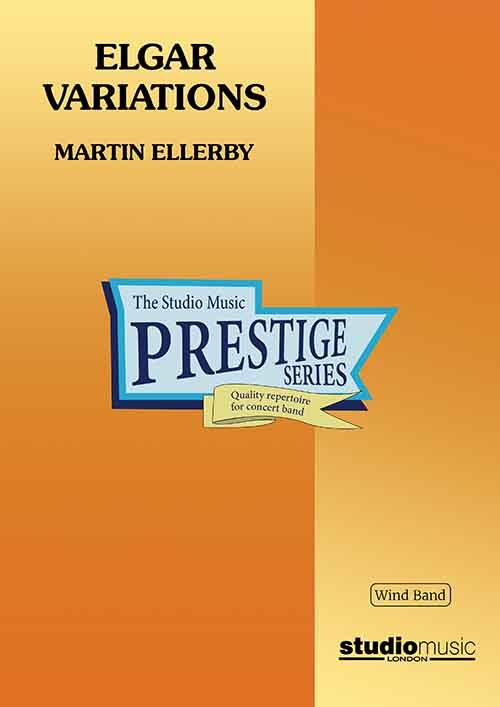 £164.95
£164.95Elgar Variations (Concert Band - Score and Parts) - Ellerby, Martin
The year 2007 marked the 150th anniversary of the birth of the British composer Sir Edward Elgar (1857-1934) and as such I thought it an appropriate moment to write something in tribute to this event. There are quite a few enigmas about this piece and they are all intentional! First and foremost is that the variations are not constructed on any of Elgar's actual themes. Rather I have written a sequence of contrasting sections (all played without a break) on the essence and character of his musical style. I have also written this work with bands, the soloists within, conductors and, not least, their audience firmly in mind. The language is essentially tonal and the test musical rather than overtly technical. There are no tempo indications other than suggested metronome marks. I have deliberately kept things to a minimum as the true test here is to find the style and interpret that aspect over the whole structure. Whereas the faster sections are more or less self explanatory the slower parts require deliberate rubato and much feeling. This is for the conductors to discover and I encourage them to do so. Adjudicators should be fully aware that I sanction this aspect but it requires an insight and understanding to successfully execute so 'any old thing' will not suffice! The 'variation' commencing at rehearsal letter P is the emotional core of the piece and requires a passionate but not saccharine approach to pacing and sensuality. The cadenza type material is built into the process rather than being a separate sequence of entities. There are many allusions to the music of Elgar here without recourse to blatant pastiche - if it is thought of as a series of songs and dances this may help. The final comment is the dedication, after one of Elgar's own but subtly adjusted: to my friend pictured within - never to be revealed - now there's an enigma!- Martin EllerbyDuration: 14.00Recorded on Polyphonic QPRM155D Scenes from Childhood (Great British Music for Wind Band Vol.15), Royal Northern College of Music Wind Orchestra
Estimated dispatch 7-14 working days
-
 £32.95
£32.95Elgar Variations (Concert Band - Score only) - Ellerby, Martin
The year 2007 marked the 150th anniversary of the birth of the British composer Sir Edward Elgar (1857-1934) and as such I thought it an appropriate moment to write something in tribute to this event. There are quite a few enigmas about this piece and they are all intentional! First and foremost is that the variations are not constructed on any of Elgar's actual themes. Rather I have written a sequence of contrasting sections (all played without a break) on the essence and character of his musical style. I have also written this work with bands, the soloists within, conductors and, not least, their audience firmly in mind. The language is essentially tonal and the test musical rather than overtly technical. There are no tempo indications other than suggested metronome marks. I have deliberately kept things to a minimum as the true test here is to find the style and interpret that aspect over the whole structure. Whereas the faster sections are more or less self explanatory the slower parts require deliberate rubato and much feeling. This is for the conductors to discover and I encourage them to do so. Adjudicators should be fully aware that I sanction this aspect but it requires an insight and understanding to successfully execute so 'any old thing' will not suffice! The 'variation' commencing at rehearsal letter P is the emotional core of the piece and requires a passionate but not saccharine approach to pacing and sensuality. The cadenza type material is built into the process rather than being a separate sequence of entities. There are many allusions to the music of Elgar here without recourse to blatant pastiche - if it is thought of as a series of songs and dances this may help. The final comment is the dedication, after one of Elgar's own but subtly adjusted: to my friend pictured within - never to be revealed - now there's an enigma!- Martin EllerbyDuration: 14.00Recorded on Polyphonic QPRM155D Scenes from Childhood (Great British Music for Wind Band Vol.15), Royal Northern College of Music Wind Orchestra
Estimated dispatch 7-14 working days
-
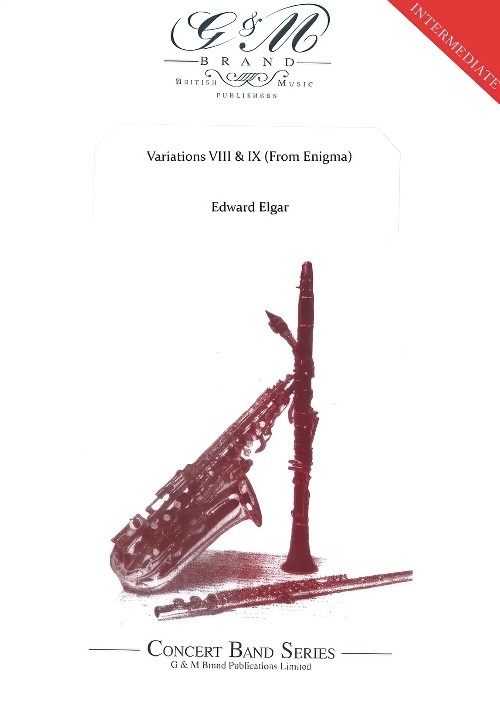 £59.95
£59.95Variations VIII & IX (From Enigma) (Concert Band - Score and Parts) - Elgar, Edward - Brand, Geoffrey
Elgar's Variations for orchestra were written during 1898-9; they are dedicated "To my friends pictured within" Each of the 14 variations is a musical portrait to one of the composer's friends. Over the 17 bar theme which inspired the Variations, Elgar wrote the word ENIGMA. Later he said, "The ENIGMA I will not explain - its "dark saying" must be left unguessed" In Variation VIII W.N. is Winifred Norbury. In 1897 local friends organised a choral and orchestral society for Elgar to conduct. The secretaryship of The Worcester Philharmonic, as the society was called, was shared by two ladies, of whom W.N.. was one She has been described as "very sedate and calm, rather like a kind governess with Elgar, but had a sense of humour - and a laugh, rather like a deep bell". Variation IX Nimrod is Elgar's deeply felt tribute toA.J.Jaeger, his German-born friend who worked for the publisher Novello and Co. His sincere support meant a great deal to Elgar. Jaeger, in German, means "hunter". Elgar concealed this in the nickname Nimrod. The variation has become extremely popular and is often played on thoughtful occasions. In this arrangement, either W.N. or Nimrod can be played alone. However, in the Variations they are linked by Elgar in an inspired manner.
Estimated dispatch 7-14 working days
-
 £11.95
£11.95Variations VIII & IX (From Enigma) (Concert Band - Score Only) - Elgar, Edward - Brand, Geoffrey
Elgar's Variations for orchestra were written during 1898-9; they are dedicated "To my friends pictured within" Each of the 14 variations is a musical portrait to one of the composer's friends. Over the 17 bar theme which inspired the Variations, Elgar wrote the word ENIGMA. Later he said, "The ENIGMA I will not explain - its "dark saying" must be left unguessed" In Variation VIII W.N. is Winifred Norbury. In 1897 local friends organised a choral and orchestral society for Elgar to conduct. The secretaryship of The Worcester Philharmonic, as the society was called, was shared by two ladies, of whom W.N.. was one She has been described as "very sedate and calm, rather like a kind governess with Elgar, but had a sense of humour - and a laugh, rather like a deep bell". Variation IX Nimrod is Elgar's deeply felt tribute toA.J.Jaeger, his German-born friend who worked for the publisher Novello and Co. His sincere support meant a great deal to Elgar. Jaeger, in German, means "hunter". Elgar concealed this in the nickname Nimrod. The variation has become extremely popular and is often played on thoughtful occasions. In this arrangement, either W.N. or Nimrod can be played alone. However, in the Variations they are linked by Elgar in an inspired manner.
Estimated dispatch 7-14 working days
-
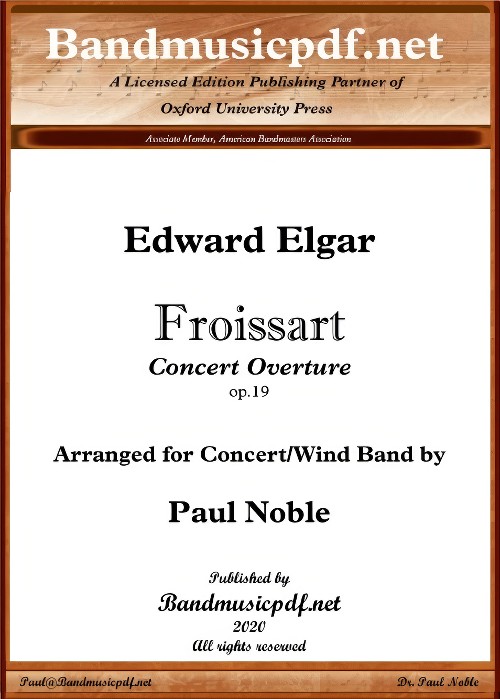 £150.00
£150.00Froissart (Concert Band - Score and Parts) - Elgar, Edward - Noble, Paul
Froissart, Op. 19, is a concert overture by Edward Elgar, inspired by the 14th-century Chronicles of Jean Froissart. Elgar was first attracted to the Chronicles after finding mention of them in Walter Scott's Old Mortality. Jean Froissart (c. 1337 - c.1405), often referred to in English as John Froissart, was a medieval French chronicle writer. For centuries, Froissart's Chronicles have been recognized as the chief expression of the chivalric revival of the 14th century Kingdom of England and France. The motto written by Elgar on the manuscript score is a quotation from an 1817 poem by Keats: 'When Chivalry lifted up her lance on high.' Froissart is not a programmatic work: unlike the later Falstaff or even Cockaigne it does not tell a detailed story; it evokes a mood and manner in broad terms. The drama of the dynamics enhances the haunting melodies that identify Elgar's compositions.
Estimated dispatch 7-14 working days
-
 £79.99
£79.99Land of Hope and Glory - Edward Elgar
Elgar's five Pomp and Circumstance Marches were written between 1901 and 1930 with number 1 undoubtedly being the most popular of the five. King Edward VII told Elgar that the tune would 'go round the world' if words were fitted to it. Elgar took the hint and included it (with slight rhythmic changes) in his Coronation Ode of 1902, with words by A. C. Benson. Thus was born Land of Hope and Glory which is now, of course, an integral part of the annual Last Night of the Proms, when the audience (with varying degrees of success!) sing the words along to the original march. Now your concert band can enjoy all the pomp and ceremony of the proms with this arrangement by Philip Sparke.
Estimated dispatch 7-14 working days
-
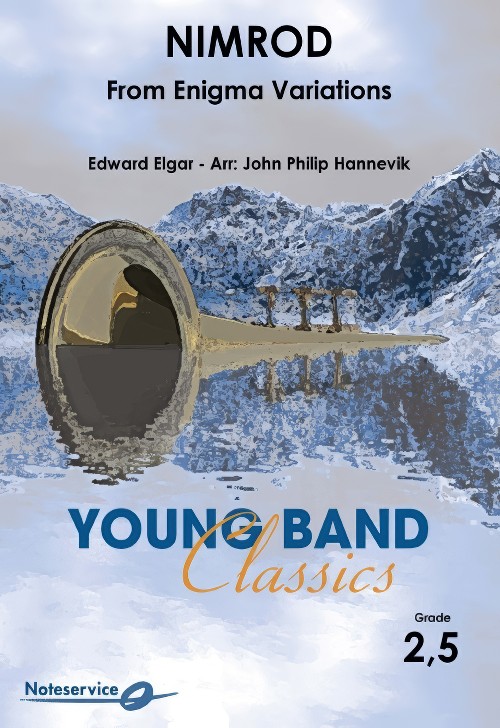 £85.00
£85.00Nimrod (from Enigma Variations) (Concert Band - Score and Parts) - Elgar, Edward - Hannevik, John Philip
Edward Elgar composed his Variations on an Original Theme, Op.36, popularly known as the Enigma Variations, between October 1898 and February 1899. It is an orchestral work comprising fourteen variations on an original theme. Elgar dedicated the work "to my friends pictured within", each variation being a musical sketch of one of his circle of close acquaintances. Nimrod (the mighty hunter before the Lord) has become the most played of the variations, and the movement is dedicated to Elgar's close friend Augustus Jaeger (Jager being German for hunter). Duration: 4.15
Estimated dispatch 7-14 working days
-
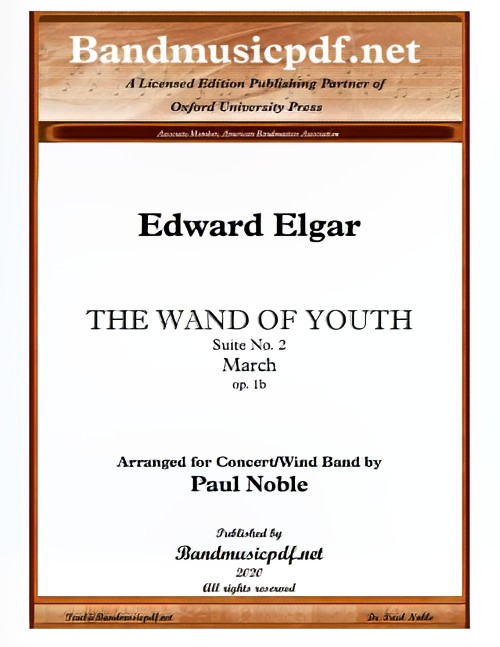 £75.00
£75.00The Wand of Youth, Suite No.2, March (Concert Band - Score and Parts) - Elgar, Edward - Noble, Paul
The Wand of Youth suites were written in 1869 when Elgar was only twelve years old, music written for a play and acted by the Elgar children for a private family theatrical production. He noted the tunes down in a sketchbook and in 1907, forty years later, he rearranged with only minor changes and orchestrated them as the two suites titled The Wand of Youth, Suite Nos. 1 and 2. Although the Wand of Youth Suites date from Elgar's mature years, he insisted on calling it Opus 1, because he wrote these pieces originally for piano many years earlier. The March is the first movement of The Wand of Youth, Suite No. 2. The arranger has presented this movement as an example of an excellent concert opener or warm-up march for a festival or contest performance because of its delicacy, yet determination.
Estimated dispatch 7-14 working days
-
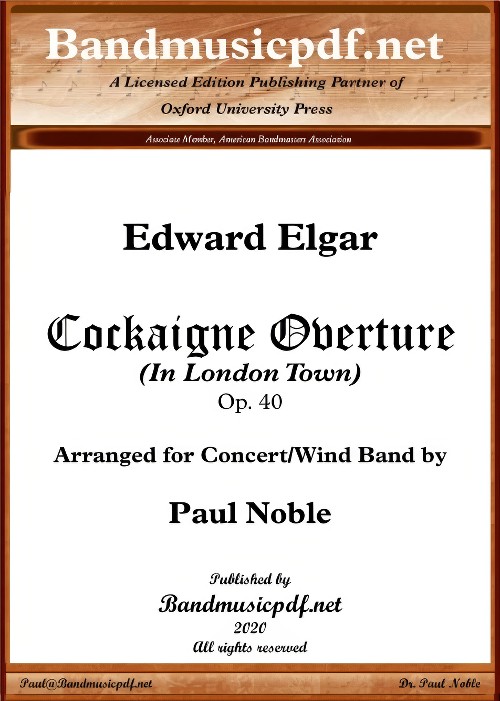 £150.00
£150.00Cockaigne Overture (In London Town) (Concert Band - Score and Parts) - Elgar, Edward - Noble, Paul
Cockaigne Overture was composed when Edward Elgar received a commission from the Royal Philharmonic Society, and he reported that the new piece was "cheerful and Londony, 'stout and steaky'...honest, healthy, humorous and strong, but not vulgar." The first performance was in the Queen's Hall, London, on 20 June 1901, conducted by the composer. He dedicated the work to his "many friends, the members of British orchestras." The music was an immediate success and became one of Elgar's most popular works. In its 15 minutes or so, the overture gives a lively and colourful musical portrait of Edwardian London. 'Cockaigne' was a term used by moralists at that time as a metaphor for gluttony and drunkenness, while Britain adopted the name humorously for London, and from it we get the Cockney. Cockaigne or Cockayne /ka' kein/, the word origin tracing back to the 13th century, is a land of plenty in medieval myth, an imaginary place of extreme luxury and ease where physical comforts and pleasures are always immediately at hand and where the harshness of medieval peasant life does not exist. The work presents various aspects of turn-of-the-century London and Londoners. It begins with a quiet but bustling theme which leads into an unbroken sequence of snapshots: the cockneys, the church bells, the romantic couples, a slightly ragged brass band (perhaps the Salvation Army) and a contrastingly grand and imperious military band. The broad theme representing Londoners has been stated as the first occurrence of Elgar's trademark direction, 'nobilmente.' The work ends in a characteristically Elgarian blaze of sound, including an optional full organ.
Estimated dispatch 7-14 working days
-
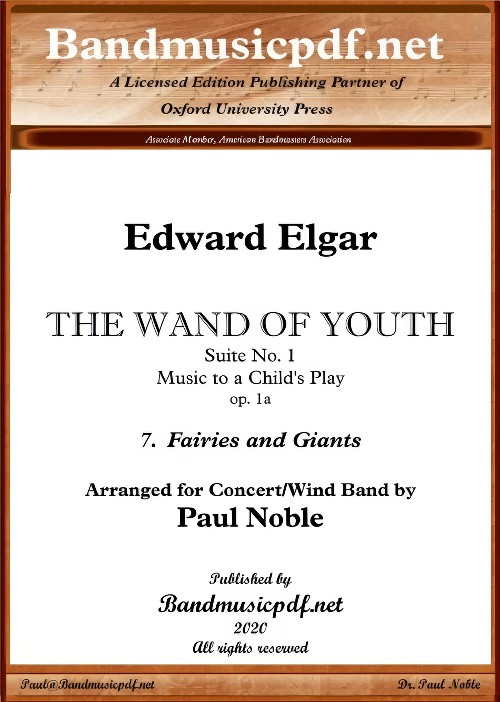 £50.00
£50.00The Wand of Youth, Suite No.1 - VII. Fairies and Giants (Concert Band - Score and Parts) - Elgar, Edward - Noble, Paul
The Wand of Youth suites, subtitled Music to a Child's Play, were written in 1869 when Elgar was only twelve years old, music written for a play and acted by the Elgar children for a private family theatrical production. He noted the tunes down in a sketchbook and in 1907, forty years later, he rearranged with only minor changes and orchestrated them as the two suites titled The Wand of Youth, Suite Nos. 1 and 2. Although The Wand of Youth suites date from Elgar's mature years, he insisted on calling it Opus 1, because he wrote these pieces originally for piano many years earlier.
Estimated dispatch 7-14 working days
